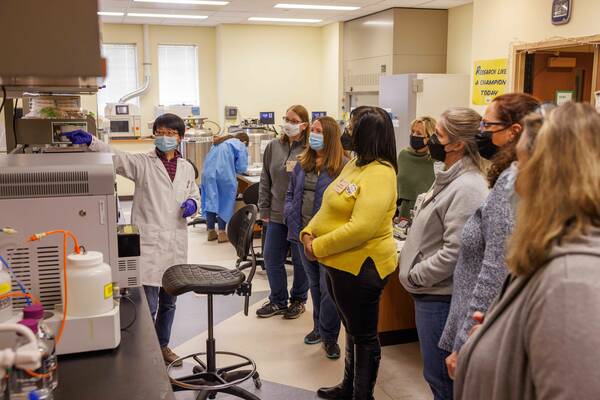
Faculty with the Harper Cancer Research Institute at the University of Notre Dame hosted a workshop for local K-12 educators as part of Teachers as Scholars, a professional development program administered by the Notre Dame Office of Public Affairs.
The two-day workshop, Feb. 17 and 22, focused on cancer research and treatment, with a combination of interactive lectures, panel discussions and laboratory tours.
Educators from four local school districts — South Bend, Mishawaka, Union North United and the Catholic Diocese of Fort Wayne-South Bend — learned how to talk about cancer both in the classroom and with students who are affected by it.
Harper faculty Thomas O’Sullivan, assistant professor of electrical engineering at Notre Dame, and Jeni Prosperi, associate professor of biochemistry and molecular biology at Indiana University School of Medicine-South Bend and adjunct associate professor of biological sciences at Notre Dame, led the workshop.
Presenters included a variety of cancer physicians, researchers and survivors.
“The whole purpose was: How do we better connect Harper and cancer research with the community?” O’Sullivan said, and, at the same time, equip educators to talk about cancer as it relates to science, technology, engineering and mathematics — the so-called STEM disciplines.
“Most students have decided by eighth grade whether or not they want to go into a STEM field,” O’Sullivan said. “So the more that we can excite teachers in this very important area of science, the better it is to meet the future needs of the workforce.”
Part of Notre Dame Research, the Mike and Josie Harper Cancer Research Institute is a novel collaboration between Notre Dame and the Indiana University School of Medicine-South Bend that seeks to address cancer-specific problems, such as tumor targeting and tumor-host communication, via a unique multidisciplinary approach.
This is important because nearly 40 percent of people will be diagnosed with cancer at some point during their lifetimes, according to the National Institutes of Health.
“Cancer is something that touches everybody, so the more we can educate the community and prepare people to talk about it the better,” said Prosperi.
Added O’Sullivan, “Whatever we can do to demystify cancer is important.”
For Mollie Wassner, whose brother-in-law died of bladder cancer at the age of 57, the workshop was a welcome introduction to Harper and to cancer research more broadly.
“I didn’t know how much (cancer) research is being done through IU and Notre Dame,” said Wassner, who teaches family and consumer sciences at Riley High School in South Bend. “That was a surprise.”
A believer in the power and possibility of lifelong learning, Wassner has participated in several
Teachers as Scholars workshops over the years and has high praise for the program.
“The University has really done an outstanding job in what they offer,” she said. “It is such a gift for those of us who enjoy the opportunity to learn in a university setting.”
Now in its 21st year, Teachers as Scholars provides local teachers and administrators the opportunity to gather with fellow educators to study, discuss and reflect upon scholarly issues with Notre Dame faculty.
Participating teachers receive 15 points toward the routine renewal of their professional educators license.
For more information, visit publicaffairs.nd.edu/our-work/teachers-as-scholars.